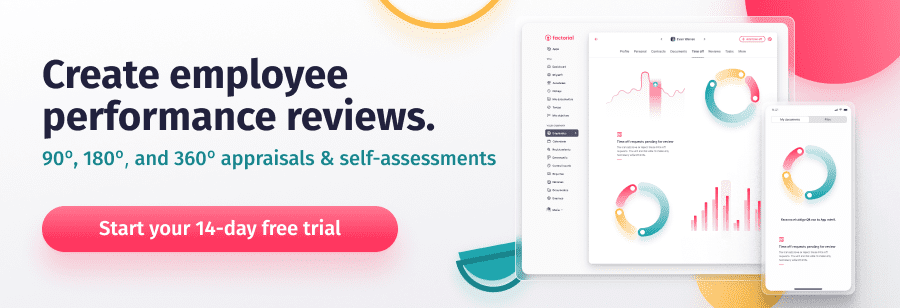In this article, we will discuss how a staff appraisal meeting can improve an employee’s performance. We will break down what staff appraisals are, how they work and how they can benefit your company. We will also run through a checklist of the most important things to consider when you prepare for your appraisal meeting. Finally, we will take a look at how using performance management software can simplify the appraisal process so that it works for the benefit of both your company and your employees.
✅Download Your Free Performance Appraisal Template
Staff Appraisal Definition
A staff appraisal is a meeting held with an employee to discuss their performance and future development within the company. They are often used to determine whether goals have been met and to discuss the future potential growth of an employee. In some cases, they can also be used to determine whether an employee is eligible for a bonus or salary increase.
Traditionally, performance appraisals include a face-to-face meeting between a manager and staff member to discuss past performance and future expectations. They also include a review of past objectives and the setting of new goals which the employee can work towards before the next review.
Although there is no legal requirement to conduct staff appraisals, an effective staff appraisal system can help your employees understand what is expected of them and give them an opportunity to highlight any training or development needs. They promote open lines of communication with employees and help to align employee performance with strategic business goals.
How Can They Improve Performance?
An appraisal offers a valuable opportunity to discuss an employee’s performance in a formal setting. The main purpose of a staff appraisal is to clarify job requirements, monitor progress towards goals, and identify any potential areas for improvement. This helps employees create clear action plans to help them work more efficiently and achieve their objectives. It also encourages improved future performance and increases overall productivity.
An effective performance appraisal system also serves one other very important purpose: it opens up the lines of communication between employees and managers and enables constructive dialogue. Employees feel they have a platform for sharing any issues they might have, and the feedback they receive back helps them understand what is expected of them. Additionally, if an employee feels heard and supported, they will naturally feel more motivated to perform.
A well-managed appraisal meeting can lead to employee engagement and alignment of goals, provide direction, and ultimately ensure career fulfilment.
What to Discuss in a Staff Appraisal Meeting
The main focus of a staff appraisal meeting should be the exchange of expectations, plans and goals. Managers should aim to establish what the employee is working on at the moment, what goals they are prioritising, and what the outlook is for the months ahead. They should conduct a full review of the employee’s performance since the last meeting and motivate them to share constructive feedback and highlight areas for development. Positive behaviours should be praised and reinforced, and negative behaviours should be highlighted so that they can be improved.
Both parties should prepare for the meeting in advance so that all-important points are covered and all concerns are raised. Why were they successful with certain tasks? Have they exceeded expectations or underperformed? How could they have performed better? What support do they need? The meeting should cover their past and future performance, goals, strengths and weaknesses. It should also focus on the root cause of any issues that they are experiencing. You might uncover a problem you were not aware of, or an issue that is out of the employee’s control.
The second half of the meeting should focus on goals for the future. Ask for the employee’s input. How do they think they could improve before the next staff appraisal? Which goals do they think they can achieve? What is stopping them from performing better? Do they need any training or development? Make sure any goals you set are SMART: specific, measurable, agreed, realistic and time-limited.
5 Tips for An Effective Staff Appraisal
We’ve covered the positive impact a staff appraisal can have on performance and what you should discuss in one. Here are five tips to follow when you are running staff appraisals to make the whole process as effective as it can be:
- Prepare: review previous discussions, gather input from peers, managers and self-assessments and ensure you have a list of key achievements, areas for improvement and ideas for development.
- Make it a discussion: asking open questions and listening actively to the employee’s contribution will encourage them to share their thoughts, challenges and goals.
- Focus on the strengths: highlighting what someone is doing well makes them more likely to feel positive and respond better to constructive feedback. A good rule to use is 70/30 positive/negative.
- Set goals: use the SMART goal approach to set goals that the employee can achieve and align with their own and the company’s objectives.
- Follow-up: a good appraisal process doesn’t just exist in one meeting but is a continual conversation that checks in on progress, provides ongoing support and boosts morale (and productivity).
Staff Appraisal Checklist
The staff appraisal process consists of three stages: preparation, the meeting itself and the reflection and analysis stage.
Your appraisal checklist should look a little something like this:
Preparation:
- Review objectives set at past appraisals.
- Invite employees ahead of time and remind them to prepare for the appraisal (are there any points they want to bring up?).
- Set aside sufficient time for the meeting so that all points can be discussed.
- Prepare a self-evaluation sheet for the employee so that they can share their feedback and evaluate their own performance.
- Think about your goals and objectives. Which points would you like to raise? Do you have evidence to support your reasoning? What improvements would you like to see after the meeting? Are you aware of the employee’s strengths and weaknesses? How did the last meeting go? Consider using a free staff appraisal template to help you identify areas you want to focus on.
- Make sure appraisals are consistent and held on a regular basis.
During the meeting:
- Create a calm atmosphere so that the employee feels relaxed and able to talk openly without fear of recrimination.
- Start the meeting by defining the goals and topics that you would like to discuss.
- Document any important points.
- Be attentive and encourage open dialogue.
- Work together to define realistic goals and expectations.
After the meeting:
- Reflect on how the appraisal went. How could it have been improved? Did you gather enough valuable feedback from the employee? Are the goals you have set realistic and achievable?
- Create a record of the meeting for the employee’s file.
- Support the employee to help them meet their goals before the next meeting.
Common Mistakes
The biggest mistake when it comes to staff appraisals is a lack of planning. Spontaneous meetings leave a negative impression and rarely provide any true value to you or your employees. Appraisals should be seen as a valuable tool for gathering feedback and improving staff performance and they should be a regular fixture in your company’s schedule. Both management and employees should be aware of any upcoming meetings so that both parties can prepare in advance. This way, there is a clear structure for the meeting, and everyone knows what is involved. It’s also important to set aside enough time for the meeting so that every point can be discussed in detail.
Another common error is being too vague. Make sure your feedback is specific and avoid generalisations. Provide evidence to back up any points you want to raise and stick to specific observations and examples. This will help both you and your employee create a concrete plan of action after the meeting.
Finally, the biggest mistake when it comes to staff appraisals is not involving the employee in tasks and goals. If employees don’t feel involved and goals are imposed rather than discussed, they will feel less motivated to achieve them. What do they feel is a reasonable objective? How can you support them to help them reach their goal?
Performance Management Software
One simple tool to help you effectively manage your appraisals is using performance management software. Software such as Factorial’s software solution automates the review process and helps you get a sense of your company’s pulse. Choose any one of the standard methods used for performance management and tailor it to your company. Our fully customisable performance reviews and custom reports will help you track the performance of your team. This will result in increased engagement and performance and help you identify any issues now, not six months down the line when it is too late.
The efficient management of employee performance appraisals is crucial for long term growth. After all, a company is only as good as the employees it hires.
Easily manage staff performance with Factorial's performance management feature. Try today for your 14-day free trial!
Written by Cat Symonds; Edited by Carmina Davis



